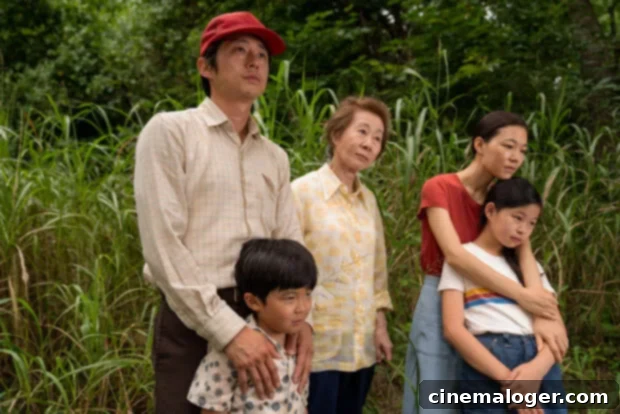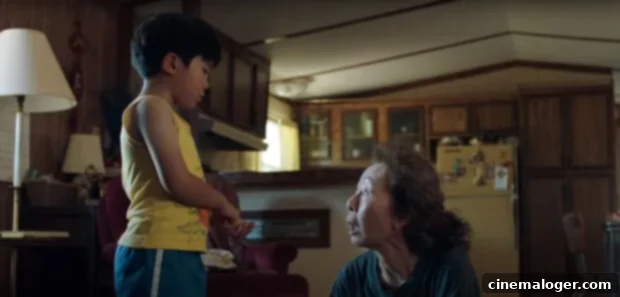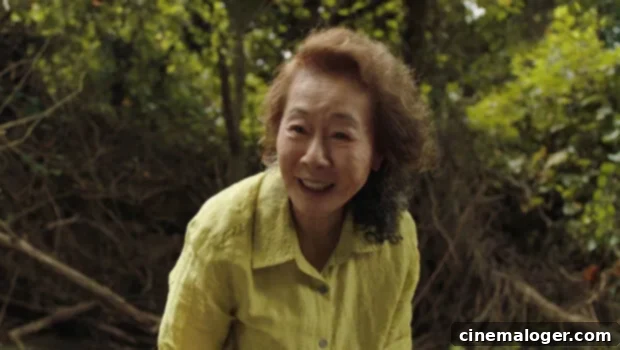Yuh-Jung Youn: The Legendary ‘Minari’ Star’s Journey to Oscar Gold and Enduring Legacy
On April 25, 2021, Hollywood witnessed a truly historic moment as Yuh-Jung Youn, the esteemed South Korean actress, gracefully accepted the Academy Award for Best Supporting Actress. Her win for the critically acclaimed film Minari was not just a personal triumph but a landmark achievement for Asian representation in global cinema. At 73 years young at the time of her win, Youn’s journey to the coveted Oscar stage was the culmination of a remarkable 50-year career, a testament to her unparalleled talent, resilience, and unwavering dedication to her craft.
Minari, a poignant and deeply moving film, garnered widespread praise and multiple accolades, securing six nominations at the 2021 Oscars. Youn’s portrayal of Soon-ja, the unconventional yet endearing grandmother, captivated audiences and critics alike. Her performance brought a complex, authentic, and often humorous dimension to the family drama, which chronicles a Korean-American family striving to build a new life on a farm in 1980s Arkansas. Long before her Oscar victory, Youn had already become an awards season darling, collecting a Screen Actors Guild (SAG) Award and a British Academy Film Award (BAFTA) for her unforgettable role.
While Minari marked Youn’s impactful American film debut, it stands as a relatively recent chapter in a career spanning half a century. Her extensive filmography boasts dozens of roles across South Korean films and television series, where she established herself as one of the most respected and versatile actresses of her generation. From navigating a challenging personal life, including a period of retirement, to becoming a global icon, Yuh-Jung Youn’s story is one of perseverance, artistic integrity, and profound cultural significance. This article delves deeper into the life and career of the woman who has truly redefined what it means to make Hollywood history.

Yuh-Jung Youn: A Pioneer Making Oscar and Awards Season History
Yuh-Jung Youn’s portrayal of Soon-ja in Minari resonated deeply, earning her universal acclaim and etching her name into the annals of cinematic history. Her powerful, nuanced, and often humorous performance broke barriers, making her the first Korean actress to win a Screen Actors Guild Award for Outstanding Performance by a Female Actor in a Supporting Role. This was quickly followed by another groundbreaking win: the British Academy Film Award for Best Supporting Actress, a remarkable feat that solidified her international recognition.
However, it was her triumph at the 93rd Academy Awards that truly cemented her legendary status. On that memorable night, Yuh-Jung Youn became the first South Korean actress in the Oscars’ entire 93-year history to win an acting award. This was not merely a recognition of an outstanding individual performance but a pivotal moment for global cinema, signifying a growing appreciation for diverse storytelling and talent from around the world. Her win sent a powerful message of inclusion and highlighted the rich contributions of Asian artists to the industry. Her acceptance speech, delivered with characteristic wit and charm, further endeared her to millions, underscoring her authentic and captivating personality.
Beyond the individual accolades, Youn’s achievement stands as a beacon of hope and inspiration for countless aspiring actors and filmmakers from underrepresented communities. It demonstrated that talent transcends geographical and cultural boundaries, and that stories from all corners of the world deserve to be seen and celebrated on the grandest stages. Her impact will undoubtedly be felt for generations, opening doors and paving the way for greater diversity in future awards seasons and film productions.
A Prolific Career in South Korean Cinema and Television
Before her global recognition for Minari, Yuh-Jung Youn was already a revered figure in her native South Korea, boasting a prolific career that began in 1966. Her acting journey started on television, but it was her iconic role in the 1971 film Woman of Fire, directed by the legendary Kim Ki-young, that catapulted her to national stardom. This film, a psychological thriller, showcased her fearless approach to complex characters and established her as a formidable talent capable of portraying morally ambiguous and intensely emotional roles. Her performance in Woman of Fire earned her multiple awards, including Best Actress at the Sitges Film Festival, marking her early international recognition.
Over the decades, Youn consistently delivered memorable performances in a diverse range of South Korean films. Her filmography includes acclaimed works such as The Housemaid (2010), a remake of the 1960 classic, where she once again demonstrated her ability to inhabit dark and unsettling roles with captivating intensity. Other notable films like The Taste of Money (2012) and Canola (2016) further showcased her versatility, allowing her to transition seamlessly between dramatic, comedic, and character-driven narratives. She has collaborated with many of South Korea’s most respected directors, earning a reputation for her meticulous preparation and unique interpretation of roles.
Her contributions extend beyond the big screen to television, where she has starred in numerous popular and critically acclaimed series. Shows like Be Strong Geum Soon, My Husband Got A Family, and Dear My Friends are just a few examples of her extensive television work. In these dramas, she often played matriarchal figures or wise, independent women, becoming a beloved presence in South Korean households. Her ability to portray both strength and vulnerability, often with a subtle wit, made her a national treasure long before Hollywood took notice. Her enduring presence in both film and television cemented her status as one of South Korea’s most respected and enduring actresses, a true veteran of the industry.
Temporary Retreat and Resilient Return to Acting
Yuh-Jung Youn’s career trajectory was not a straight path. In 1974, at the height of her early success, she made the significant decision to retire from acting after marrying renowned South Korean singer Jo Young-nam. Following their marriage, the couple immigrated to the United States, where Youn embraced a new chapter of her life away from the spotlight. This period marked a hiatus from her thriving acting career, as she focused on her family life in a new country. The decision, though personal, was a bold move for an actress who had just cemented her status as a leading lady in Korean cinema.
However, this retirement was not to be permanent. After several years in the U.S., Youn eventually returned to Korea, facing significant personal challenges. Her marriage to Jo Young-nam ended in divorce in 1987, leaving her as a single mother to their two sons. The need to provide for her children spurred her to make a courageous return to acting. Re-entering the industry after a long break, especially as a divorcee in a society that could be less forgiving, presented considerable hurdles. Despite this, Youn’s talent and determination shone through. She gradually rebuilt her career, taking on a variety of roles, initially smaller ones, and slowly reclaiming her position as one of South Korea’s most sought-after actresses. Her comeback story is a powerful testament to her resilience, courage, and unwavering commitment to her family and her craft, ultimately leading her to even greater heights than before.

A Childhood Shaped by the Korean War and Profound Sacrifices
Yuh-Jung Youn’s early life was marked by profound hardship, deeply influenced by the devastating Korean War. She and her family lived through this tumultuous period, and these experiences left an indelible mark on her perspective and values. In an interview with NPR, she candidly reflected on the “heartbreaking” realities of wartime scarcity. Her family, like many others, had to ration essential supplies, and she vividly recalled her great-grandmother’s meticulous habit of re-using water, a practice born out of dire necessity.
During her childhood, Yuh-Jung confessed to misinterpreting her great-grandmother’s frugal habits. “To me, she was very dirty, or not hygienic,” she admitted, recounting her childish frustration. “So, I didn’t like her at all. What a stupid thing [to think]. I didn’t like her because she’s not clean and she’d always say she’s not hungry. She would always skip lunch.” This youthful misunderstanding of her great-grandmother’s actions would profoundly impact her later in life. This poignant anecdote underscores the severe conditions faced by families during the war and the often-unseen sacrifices made by older generations to ensure the survival of their loved ones.
It wasn’t until Yuh-Jung reached her sixties that the true depth of her great-grandmother’s sacrifice became clear to her. “She never said, ‘I love you,’ but I realized, after I become 60 years old, all of a sudden I thought about my great-grandmother. Then I realized, ‘Oh, she was saving all the food and all the water for us.’” This revelation brought with it immense regret and a deep sense of understanding. “Every night, I prayed for her because I felt terrible,” she shared with NPR. “I ask her for forgiveness, I was very ignorant.” This experience, though initially misunderstood, instilled in her a profound appreciation for resilience, selflessness, and the quiet heroism of those who endure hardship for the sake of their families. It likely shaped her empathetic approach to character portrayal and her understanding of human nature’s complexities.
Yuh-Jung Youn’s Viral BAFTA Speech: Wit, Charm, and Unfiltered Honesty
Even before her iconic Oscar win, Yuh-Jung Youn captured the hearts of audiences worldwide with her unforgettable acceptance speech at the 2021 BAFTA Awards. Winning the Best Supporting Actress category for her role in Minari, she accepted the prestigious award virtually, but her presence was felt across the globe thanks to her unique blend of wit, humility, and disarming honesty. Her speech quickly went viral, becoming one of the most talked-about moments of the awards season.
With a twinkle in her eye, she began, “Thank you so much for this award. Every award is meaningful, but this one, especially [to be] recognized by British people, known as very snobbish people, and they approve me as a good actor. So I’m very, very privileged and happy.” This perfectly timed, self-deprecating jest about the British reputation for being “snobbish” elicited widespread laughter and immediate adoration. It was a moment of genuine, unscripted charm that cut through the formality of the event, showcasing her vibrant personality and refreshing candor.
The speech was a masterclass in engaging an audience, demonstrating her natural charisma and quick thinking. It wasn’t just humorous; it was also deeply genuine, expressing sincere gratitude for the recognition while playfully acknowledging cultural perceptions. Her unfiltered approach stood in stark contrast to many of the more conventional acceptance speeches, making hers stand out as truly memorable. This viral moment further solidified her burgeoning international appeal, proving that her captivating presence extends beyond her acting roles. It also offered a glimpse into the sharp intellect and endearing humor that have undoubtedly contributed to her enduring success and beloved status, endearing her to a global audience just weeks before her historic Oscar win.
